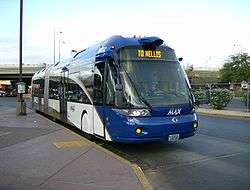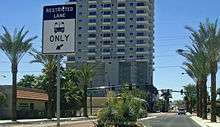Metropolitan Area Express (Las Vegas)
| MAX Line: Las Vegas Blvd North | |
|---|---|
| Overview | |
| System | RTC Transit |
| Operator | Veolia Transportation |
| Status | Active Service Route |
| Began service | June 30, 2004 |
| Ended service | February 20,2016 |
| Routes | |
| Routes | 501/113 |
| Locale | Las Vegas, Nevada |
| Start | Bonneville Transit Center |
| End | Craig Road South Station (Nellis Air Force Base) |
| Stations | 22 |
| Service | |
| Daily ridership | June 2008 Ridership: 195,203 |
The Metropolitan Area Express, or MAX, was a bus rapid transit (BRT) line owned by the Regional Transportation Commission of Southern Nevada and operated by Veolia Transportation. MAX began operations on June 30, 2004. The line is currently serviced between the Downtown Transportation Center and North Las Vegas.
As of the February 21, 2016 changes the Metropolitan Area Express (MAX) no longer operates, with additional services added to the route 113.[1]
The route currently ran on a 12-minute frequency during the day, 20 minutes at night using only 10 vehicles purchased from Irisbus in France. These vehicles can hold a passenger load of 131 passengers. All fare payment is done off the vehicle at the stations. Special ticket vending machines are at every station where passengers must pay fare before boarding as there is no fare box on board. Once on board, fare enforcement officers are at hand to check bus passes which are issued by the TVM upon payment.
TheBRT service was chosen by the RTC over light rail service due in part to costs of building and maintaining light rail. The RTC felt it was better to operate rubber tire transit rather than to have an expensive light rail system that would be too much to operate.

Safety record
All operators that drive MAX vehicles are required to have 2 years of preventable-free service. This means that a driver cannot have a preventable incident or accident for 2 years while driving for RTC Transit, the fixed route system also owned by the RTC and operated by Veolia. Then, operators are taken through training once again to be "MAX Certified".
Expansion/ACE BRT

After 4 years of service, MAX is moving forward with expansion. In August 2007, the RTC hosted a groundbreaking ceremony for the new ACE BRT system, which will replace the MAX BRT system, using new type vehicles (current MAX uses Iribus Civis, ACE will use Wright Group Streetcar LRV as well) and new station designs. The first ACE line will be named ACE Downtown Connector and will travel from the World Market Center, Downtown Las Vegas, Las Vegas Convention Center, Las Vegas Strip, before finally terminating at McCarran Airport. Construction is scheduled to be completed sometime mid-2009 with operations starting in fall 2009.
During construction for this route, construction is scheduled to begin on ACE Boulder Highway which will travel from Downtown Las Vegas, down Boulder Highway into Downtown Henderson. The RTC is looking at even further expansion with planned ACE route studies on North 5th Street, Sahara Avenue, Tropicana Avenue, Flamingo Road, and Maryland Parkway.
As of March 2008, the pavement has been completed on Grand Central Parkway, northbound from Bonneville to F Street, with the colored cement bus lane in the middle of the road. Construction is now on Grand Central SOUTH of Bonneville. Also as of March 2008, a few of the new ACE buses were already built.
Since February 2009, construction was completed on Grand Central Parkway, with the exception of the station themselves. Construction was still ongoing along Casino Center Boulevard and 3rd St. The route is set to use a dedicated lane from Grand Central to Imperial/3rd St. From that point, it is to operate in mixed flow travel, with special stations built along the route. It is expected to terminate at the South Strip Transfer Terminal.
See also
References
- ↑ "Maps, Schedules & Detours". Retrieved 2016-09-30.
